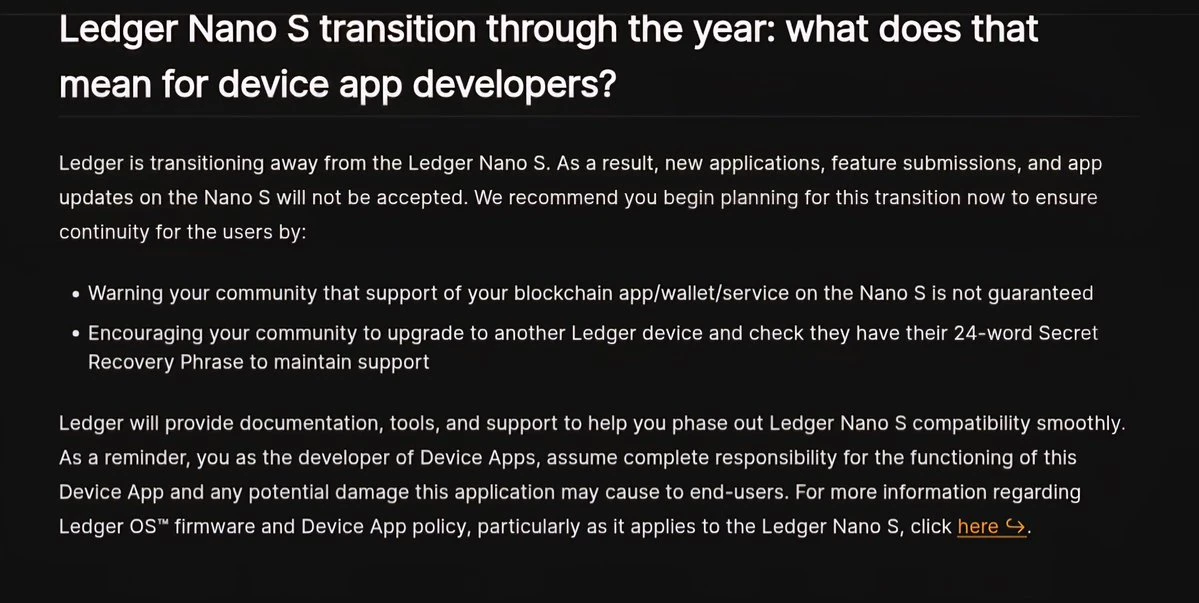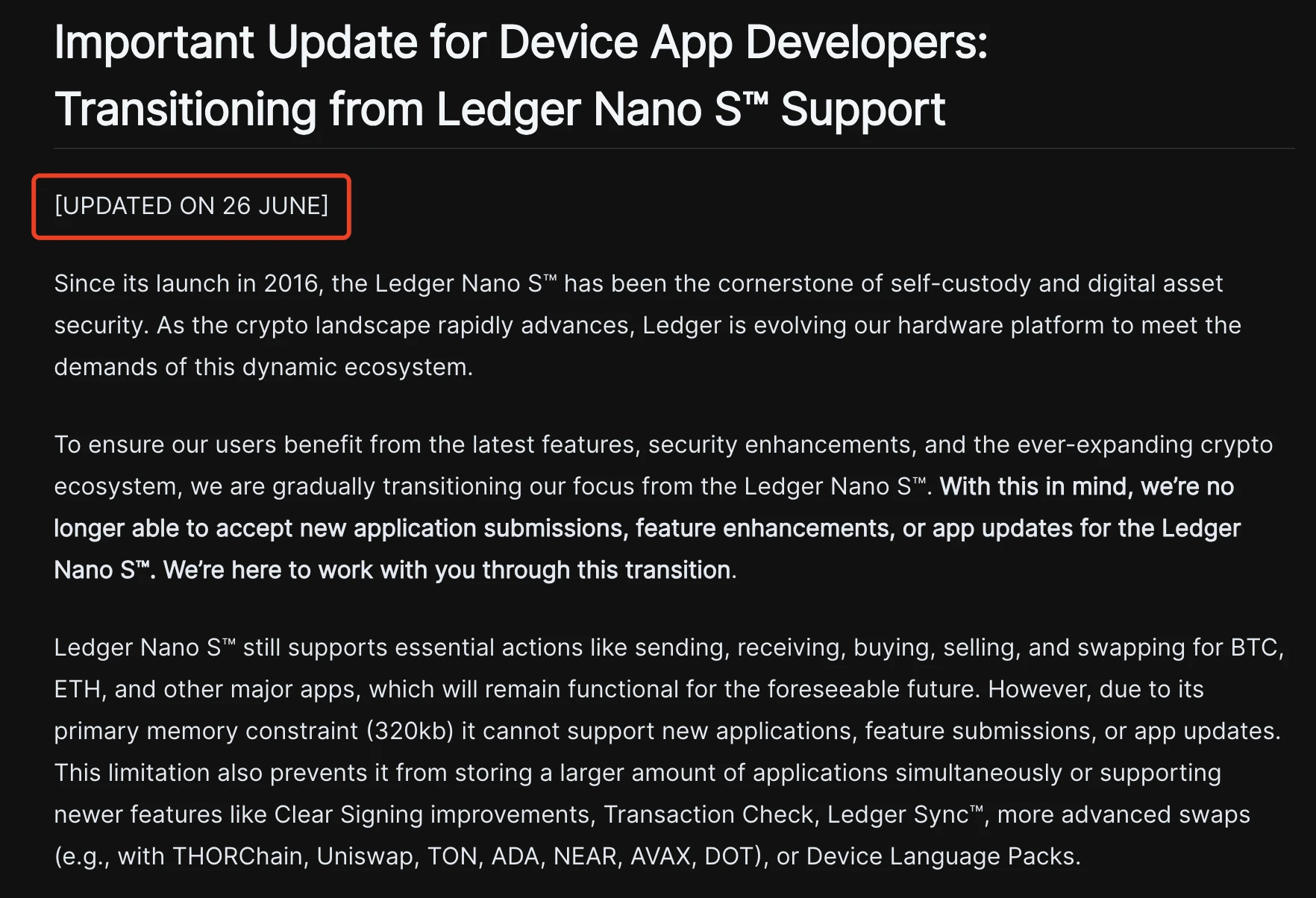Original | Odaily Planet Daily (@OdailyChina)
Author | Azuma (@azuma_eth)

The "king of hardware wallets," Ledger, has recently found itself in a whirlwind of public opinion.
The incident began when Ledger officially announced that due to memory limitations, it will gradually phase out its once flagship product, the Ledger Nano S, and is expected to stop development support for this wallet by the end of 2025. In the future, it will no longer accept new application submissions, feature enhancements, or application updates for the Nano S, and therefore recommends users upgrade to the newer Nano S Plus, Nano X, or Stax.
This announcement from Ledger has caused a huge uproar in the community, as the Nano S is the best-selling hardware wallet in the company's history and even in the entire cryptocurrency history. To this day, many users are still using this wallet for asset storage, and the sudden announcement of discontinuation of support means that a large number of users must quickly consider alternatives.
The Nano S was first launched in 2016, and Ledger officially stated that over 1.5 million units were sold in the first three years. At a launch price of 79 euros, this means that by 2019, Ledger had achieved over 118 million dollars in sales through this wallet, which significantly contributed to Ledger's subsequent gradual market share acquisition, ultimately establishing it as the "king of hardware wallets," akin to Ledger's own "iPhone 4" moment.
In response to Ledger's sudden announcement, many users expressed their dissatisfaction on social media, with some accusing Ledger of being greedy, while others warned that migrating devices could pose additional phishing risks.

Notable KOL @sudo was among the first to speak out:
Ledger is being really unreasonable. You are essentially forcing everyone to spend money on new devices and re-enter their recovery phrases. The Nano S is still very capable. I understand you need to make a profit, but please don’t joke about backward compatibility. You are one of the few trusted companies, and now you are starting to limit new features and access for commercial reasons? That’s just not right.
Another overseas KOL, @CryptoCharged, who has used Ledger products for many years, also expressed disappointment.
As a 7-year Ledger customer, seeing this announcement is really disheartening… Over time, it is normal to eventually stop supporting updates and patches for old hardware, but actively selling these devices last year and then announcing a stop to support this year is simply criminal. You should allow customers who purchased the Nano S in the last 12 months to exchange it for a Nano X or Flex and pay the price difference. Do something good, Ledger.
NFT collector @BAYC5511 directly called for a boycott of Ledger:
What the hell is this, Ledger??? Why are you stopping support for the Nano S? I’m sure many people used this device as their primary hardware wallet from 2021 to 2023. This company is worthless, and I will never buy Ledger products again.
In response to the community's outcry, Ledger's response was relatively timely, with official accounts and senior executives stepping in to reply.
Ledger's Chief Technology Officer, Charles Guillemet, provided further explanation regarding the announcement: “The Nano S was launched in 2016, during the era when BTC was only for holding, and it defined the concept of self-custody. But nearly a decade has passed, and as cryptocurrencies and their use cases have evolved, the hardware that secures them has also evolved, so we have updated our products to meet today’s needs. Why are we making this transition? Because memory has limited its upgrades. The Ledger Nano S was initially powerful, but with the rapid development of blockchain, it can no longer support new applications, feature submissions, or application updates. Just LedgerOS, Bitcoin, Ethereum, and exchange applications nearly fill its 320kb of memory, leaving almost no space for other applications. This memory limitation has caused the Nano S to be unable to support many newer features and necessary security enhancements.”
Charles and the Ledger official account added: “In the foreseeable future, BTC, ETH, and other mainstream applications can still run on the Nano S. It still supports basic operations such as sending, receiving, buying, selling, and exchanging. However, due to technical limitations, it will no longer receive the latest features or upgrades — including the latest improvements in usability and security.”
It is worth mentioning that perhaps to avoid angering the community, Ledger also revised the wording of the initial announcement, and a comparison of the two versions (the first old version and the second new version) shows that the wording has softened significantly.


As Ledger seems to have "messed up," competitors targeting the hardware wallet market will undoubtedly seize the opportunity.
Zach Herbert, founder of FOUNDATION (which is about to release the Passport Prime wallet), commented that Ledger's choice to stop supporting the Nano S has four major errors.
First, Ledger was still selling the Nano S until the first quarter of 2022 (Odaily note: there is a contradiction here with @CryptoCharged's statement; Ledger officially stopped selling in 2022, but stock of the Nano S could still be found in other channels in recent years), and many users have only used it for just over three years. In comparison, the iPhone 11 (released in 2019) still supports iOS 26 updates, while the security lifecycle of hardware wallets should be longer.
Second, the security standards for hardware wallets should be higher than those for smartphones. Apple even provides up to 10 years of security patches for devices that no longer receive iOS updates. Technically, Ledger is fully capable of continuing to receive basic security updates for the Nano S, but Ledger chose to abandon it.
Third, the Ledger applications on Bitcoin and Ethereum are open source and could have been maintained by the community in a streamlined version, but the reality is that Ledger's closed ecosystem prohibits developers from independently submitting or modifying applications; everything requires official approval.
Fourth, the estimated number of Nano S users exceeds 4 million (accounting for more than half of Ledger's total sales), and if users switch to new devices, Ledger could easily gain over 500 million dollars in revenue. Ledger's official use of vague terms like "no guarantee of support" creates panic, deliberately increasing user anxiety to promote device switching.
Zach Herbert finally called on Ledger users and developers, stating that the company will launch a convenient method for Ledger users to seamlessly switch to Passport Prime, clearly aiming to capture Ledger's market share.
The hardware wallet market is inherently a relatively slow iteration space where reputation is crucial. This incident may seem to be limited to public opinion, but it could have a long-term impact on Ledger's reputation. In the worst-case scenario, it may even cause users to hesitate when purchasing Ledger products, worrying about future compatibility issues. Whether Ledger, which has long held the throne in the hardware wallet market, will face a shake-up because of this remains to be seen.
免责声明:本文章仅代表作者个人观点,不代表本平台的立场和观点。本文章仅供信息分享,不构成对任何人的任何投资建议。用户与作者之间的任何争议,与本平台无关。如网页中刊载的文章或图片涉及侵权,请提供相关的权利证明和身份证明发送邮件到support@aicoin.com,本平台相关工作人员将会进行核查。




